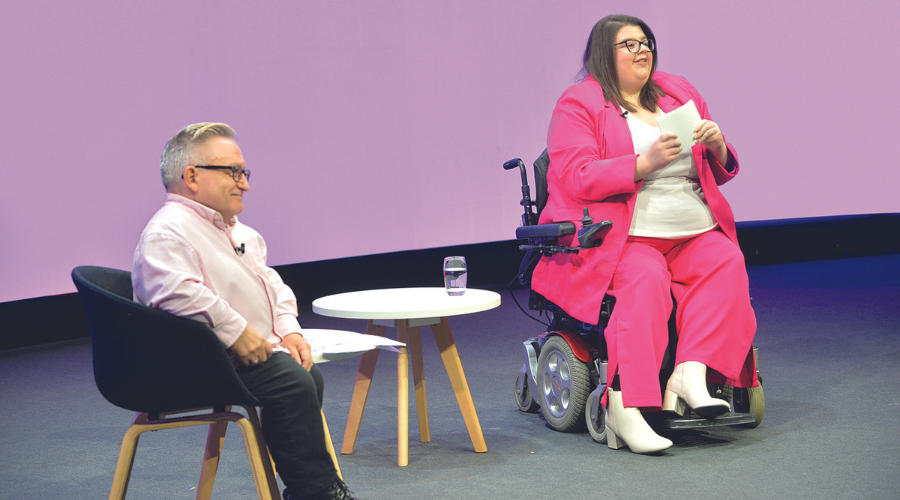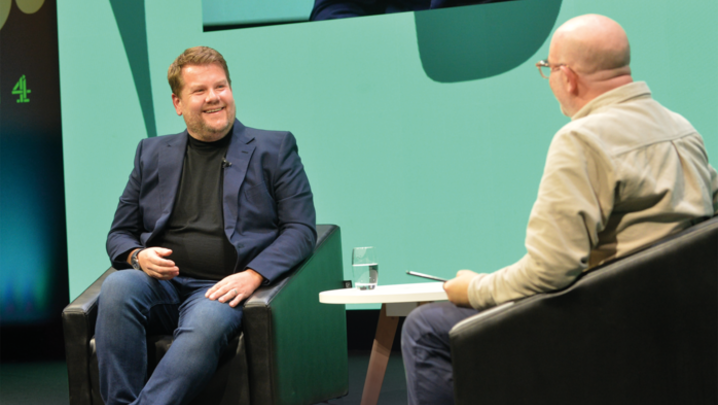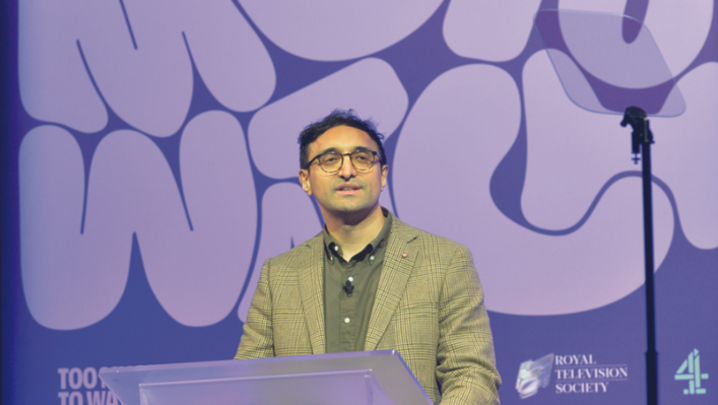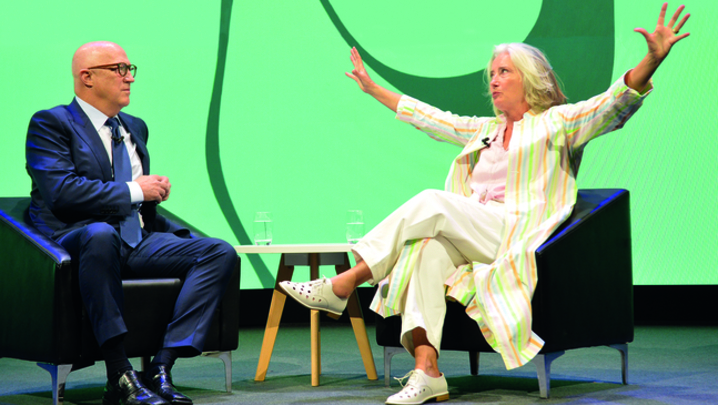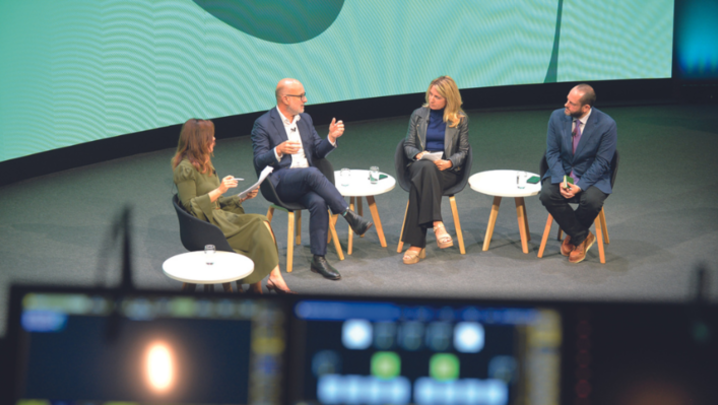Tonight we celebrate, tomorrow we go again
As an industry and medium, television’s strength is its ability to constantly evolve – and the steady, if slow, improvement in disability representation is an important part of that.
Disability consultant and Gogglebox star Simon Minty opened the session by celebrating the progress (as well as noting points of regress), before writer and actor Steph Lacey (Stay Close, Creep) reflected on the work still to be done.
“I grew up in the 1970s and 1980s,” Minty began. “There’s something called ‘mirror image’, where, if you’re different and then you see people like you, that can be startling.” At that time, the small people he saw on TV were either in fantasies or comedies, so “it was never real, or it was comedic, where we were the butt of the joke”.
In a bid for realistic representation, the 2002 Broadcasters’ Disability Network manifesto saw the terrestrial channels pledge to increase portrayals of disabled people and provide more employment opportunities in the industry.
Using tenets from the TV Access Project, an updated pledge from 10 of the UK’s biggest broadcasters and streamers, Minty highlighted “Five As” that act as a path to these goals:
- Anticipate suggests expecting to work with disabled people on a regular basis – and the 2012 Paralympics proved a case in point. It was not necessarily realistic in its representation, because not all disabled people are world-class swimmers, joked Minty, but “it made me more confident to wear my bikini”.
- Ask invites disabled people to let their accessibility needs be known so they can participate. “I turn on my TV, it doesn’t matter what time of day or night, I can be watching a drama, Question Time, a comedy, a travel show – there is a disabled person on it. It is invariably Rosie Jones, admittedly, but that’s a good thing,” Minty said.
- Assess is a question of self-reflection. Minty noted: “Individuals are allowed to do whatever they want with their lives. But I couldn’t quite work out the Seven Dwarves show. It felt a bit voyeuristic. There was something that made me think: ‘You’ve slipped back a bit.’” However, in 2020, CripTales – the BBC comedy drama written, produced, directed and acted by disabled people – was an example of representation done well. “It was personal, it was real and we could tell our stories. I thought it was amazing. It was a one-off and we haven’t done it again. I know ITV looked at it, so maybe it will come back.”
- Adjust shines the light on removing the barriers that put people at a disadvantage. Strictly Come Dancing shimmied up to the challenge of showing how inclusion was done. A shining example was the must-see moment that Rose Ayling-Ellis and her dance partner, Giovanni Pernice, brought to the 2021 series. “In terms of public consciousness, this was really, really powerful stuff,” said Minty.
- Advocacy began with Minty spending “20 years knocking on doors, attending events and dinners, doing training and advocating – but from the outside”. Yet, in the last two decades, people he had been advocating to – such former BBC Director-General Mark Thompson – have championed the good word from inside the industry.
At the start of his journey as an advocate, one of Minty’s goals was to see a disabled person present Blue Peter, which came to pass earlier this year when Abby Cook joined the team. He recalled: “I was told they couldn’t have a wheelchair user [as a presenter] on Blue Peter because in the auditioning process you need to be able to bounce up and down on a trampoline while interviewing someone. I’m pleased to see they’ve lapsed that criterion.
“When it happened, I thought: ‘My work here is done. I can happily retire.”
It was then Lacey’s turn to command the room. “Let’s not retire just yet – there is still work to be done,” she said. “In a society where 20% identify as deaf, disabled or neurodivergent (DDN), even if we doubled the current level of representation, we would not have proportional inclusion on TV.”
Although the current level of representation is said to be 8%, Lacey asked the Cambridge audience to look hard at the data. “Is it by real, meaningful inclusion or is it by giving a disabled person two lines in one scene across a whole series?” she asked. “Off-screen, where have we got 6.5% representation? Is it by DDN people being allowed to lead shows, direct and produce? Or is a large number of people who are on shadowing schemes or in junior positions?
“For me, what that speaks to is a pervasive lack of trust in disabled people. We’re still seen as a mysterious, mythical and risky ‘other’. But it doesn’t have to be that way.”
To help dismantle reticence in hiring disabled people, she set out pointers. Lacey works for Bafta award-winning company TripleC, which works to increase representation of disabled people in the arts and screen industries and has a network of 1,800 creatives. “You don’t have to worry about where to find us any more, we’re right here.”
Training is a key element, too: “Help people remove the fear of working with DDN talent by equipping them with the language, attitudes and approaches to working with us.
“I regularly run access training with TripleC for broadcasters, productions, cast and crew. It is a moment when you can remove the fear, ask questions, and do that without judgement,” she said.
As writers, disabled people should be trusted with opportunities, and not only to depict stories about disabilities. “Trust us like you trust other writers with other people’s stories,” she said.
Similarly, Lacey continued, normalise auditioning disabled actors for all roles, not just those where the character is disabled: “As an added bonus, you won’t have to worry that you’ve written them as a disabled stereotype, because you’ll have just written them as a character.”
When hiring crew, it’s a simple case of asking what their adjustments are, rather than assuming the barriers will be too great. Access co-ordinators can help embed this as part of a process. “They’re a new role in the industry,” Lacey said. “Working with them makes it so much easier to implement these requirements. If you make [the workplace] accessible from the start, then you won’t have to worry about where you can include DDN talent – you can just do that as you go along.
“TripleC, along with our delivery partners, are running an access co-ordinator scheme this year, so come and talk to us about how we can facilitate that.”
Lacey cited The A Word spin-off Ralph & Katie as a good example of using access co-ordinators. “Brazen Productions even produced legacy documents. They are on its website and you can consult those to make your productions accessible, too,” she said.
As the session drew to a close, Minty reflected on a picture he showed earlier from when he was campaigning in 2002 – he was Lacey’s age at the time. With a grin, Lacey addressed the audience: “I beg you to listen to what I just said… because I don’t want to still be doing this at his age.”
Session Ten, ‘Tonight we celebrate, tomorrow we go again: a disability access journey’, featured writer and actor Steph Lacey and Simon Minty, Disability and Diversity Consultant and Director, Sminty Ltd. It was produced by Simon Minty. Report by Shilpa Ganatra.

